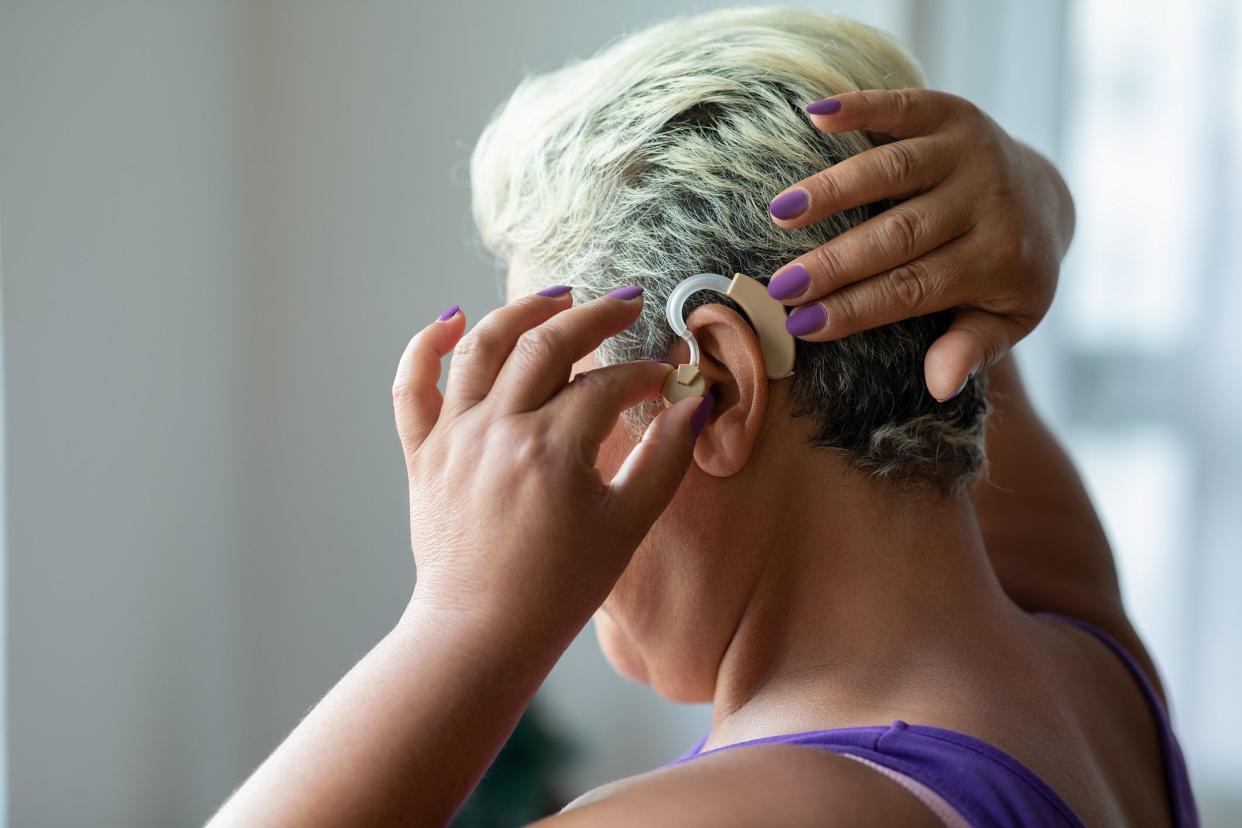How to Deal with Losing A Loved One to Alzheimer’s Complications
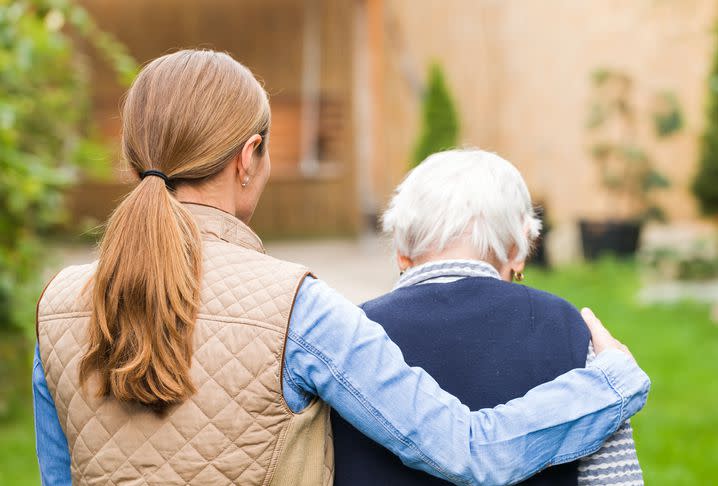
I once heard a monk talk about the process of finding one’s identity. He likened it to looking in a dusty mirror, the actual self obscured until the dust can be cleared away.
Watching my mom’s progression through Alzheimer’s disease was the opposite of that. First, there was a mirror that reflected a vibrant, beautiful woman. With each passing day, the dust gathered, the image growing increasingly cloudy until I could hardly see her at all.
What you should know about my mom is this: Her name was Heide, and she was born and raised in Germany. Every day she drew on perfect eyebrows with a Maybelline pencil, even just to drop me off at school, and she draped herself with oversized costume jewelry because she loved to sparkle. She wanted to travel the world and see the far-flung places she had read about in magazines, but she was diagnosed with early-onset dementia in her 50s before she could take any of the trips she dreamed about.
The diagnosis was a shock. It was like being thrown into a cold pool, and you didn’t even know a pool existed. My family didn’t know anything about Alzheimer’s, or any kind of dementia, for that matter. The disease didn’t even register as a concern or a threat until this diagnosis made it one.
We also had no idea my mom’s mind was already a battleground, that she no longer knew how to tell time, she didn’t know the president’s name, she couldn’t tell us the year. On the outside, my mom appeared the way she always had, but the woman inside was already untethered and difficult to reach.
At the time I was in my 20s, working at my first job as a newspaper reporter, and I approached the disease like any other story. First I read everything I could, from articles to caregiver guides, and when that became too grim, I moved on to the only other thing I knew how to do — write. I filled notebooks with details about my mom’s life. What she ate, how she slept, the confusion. I lived a couple of hours away, but I went home on the weekends and scrawled these notes. Somehow I thought with enough determination and diligence, I could make this diagnosis right. I’d crack this disease, get to the bottom of it, and retrieve my mom. After all, that’s how it worked in my journalism world. Ask enough questions, eventually, you find answers.
I didn’t yet know that the way I construct stories, with a beginning, a middle, and an end, wouldn’t apply in this situation. The narrative had already been lost, and the ending is always the same.
One evening my mom sat in her rocking chair, facing the window, watching cars move up and down our leafy, residential street. Dementia manifests differently in different people, and in my mom, it emerged with fierce paranoia. She was concerned the people in the cars had a secret motive, that the cars themselves were some kind of secret code. She found patterns where there were none. Three white cars in a row sent her into a tailspin.
She looked at me, gripped the sides of her head with her hands, and opened her mouth as if to scream. Instead, there was a long, terrible moment of silence before she said, “My head. Why does it hurt?"
Her voice wavered. By the tone of it, she was exhausted and confused, exactly the way I felt too. There was no way to comfort her or soothe her. She continued to rock back and forth, back and forth, watching cars. Though I held my hand on her shoulder, I couldn’t connect with her.
I think that’s the most difficult part of guiding a loved one through this disease — the aloneness of it. When a loved one is ill with something more tangible, there are ice packs and bandages, there are methods to alleviate pain. But there’s no simple fix when someone has disappeared into that dusty mirror. You simply have to let them go.
Eventually, my mom forgot who I was, and the rational part of me knew it wasn’t personal. The daughter part of me stung from the betrayal.
When my mom was in the final stages of the disease, living full-time at a nursing home, I became unmoored — first figuratively, then literally. I saved up a little money, sold my belongings, and set out to backpack solo around the world. My goal was to complete all those things my mom had wanted to do, even though she had no idea I was doing them.
It seemed like the only way to make sense of this ending — by writing a new one.
I traveled through 17 countries in South America, Africa, and Asia on a journey that would have made my mom proud. I trekked the Inca Trail to Machu Picchu and volunteered at a monkey sanctuary in the Amazon jungle. I rafted down the Nile and encountered a family of endangered gorillas in the mountains of Rwanda. I climbed to the top of Mount Sinai at night and wept at the top of this ancient place, watching the sunrise and knowing my mom was going to die.
Ten years after her diagnosis, my mom took her final and staggered breaths. I flew from Egypt to the U.S. for her funeral, and I said goodbye to who she became.
However, loving someone through Alzheimer’s also means honoring who they once were.
It’s hard. Especially in the late stages, when the disease has stolen so much and the mirror has become unquestionably thick with dust, it’s a challenge to remember the presence they once had. It’s a challenge to remember they were there all along.
In my case, her name was Heide. She was beautiful. And she gave me the world.
This article originally appeared on Giveinkind.com and was syndicated by MediaFeed.org.
More from MediaFeed:
Have Loved Ones With Dementia? These 5 Easy Tips Can Help You Stay in Touch With Them
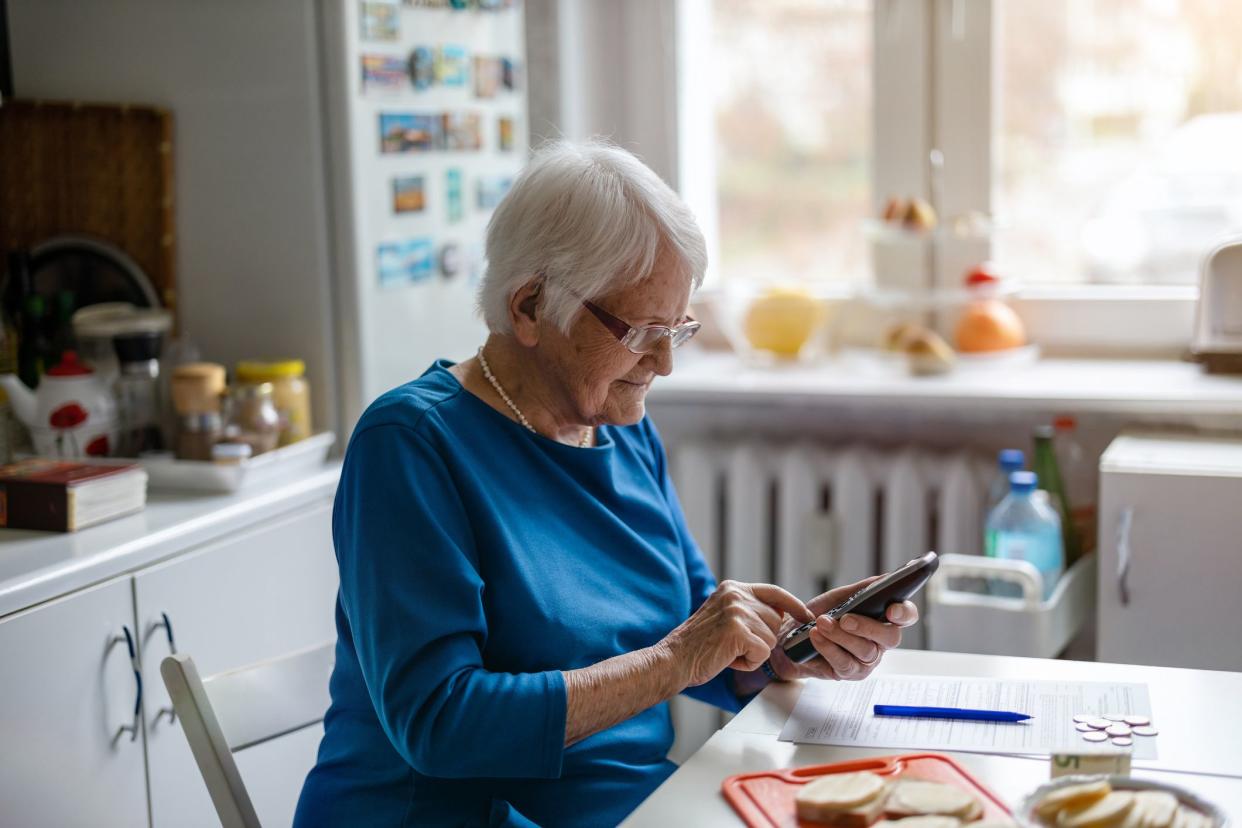
COVID-19 has left many of us feeling scared and alone. The damage done is far-reaching and has distanced us all from a life we all once took for granted.
Not only have most people isolated themselves from friends, but we’re also separated from our families. More specifically, many of us are unable to see our elderly loved ones — many of whom suffer from dementia.
Being unable to get in touch with your grandparents, parents, aunts, or uncles, adds another layer of fear and anxiety to the crisis.
Sitting back and waiting around for shutdowns to end will rob you of your peace of mind. And it’ll cut into the remaining time you have with an important person in your life. Fortunately, through the following five methods, you can stay in touch with your loved ones struggling with dementia as we continue to navigate the COVID-19 crisis.
PIKSEL/istockphoto
Part of the problem with giving support to your loved ones in this situation is that it’s challenging to coordinate effectively.
Chances are you aren’t the only family member that wants to step up to help show support. You can organize your efforts into a Care Calendar and keep everyone updated on what’s happening.
This will ensure that your entire family is on the same page and contributing to a concerted team effort. After all, staying in touch with your elder family member with dementia shouldn’t rest on your shoulders, especially amid the pandemic.
Give InKind customizes the kind of care needed, dependent on the person involved. As you’ll see with some of the following suggestions, through the calendar, family members can sign up to offer various forms of care, support, and assistance to your isolated, ailing loved one.
AndreaObzerova/istockphoto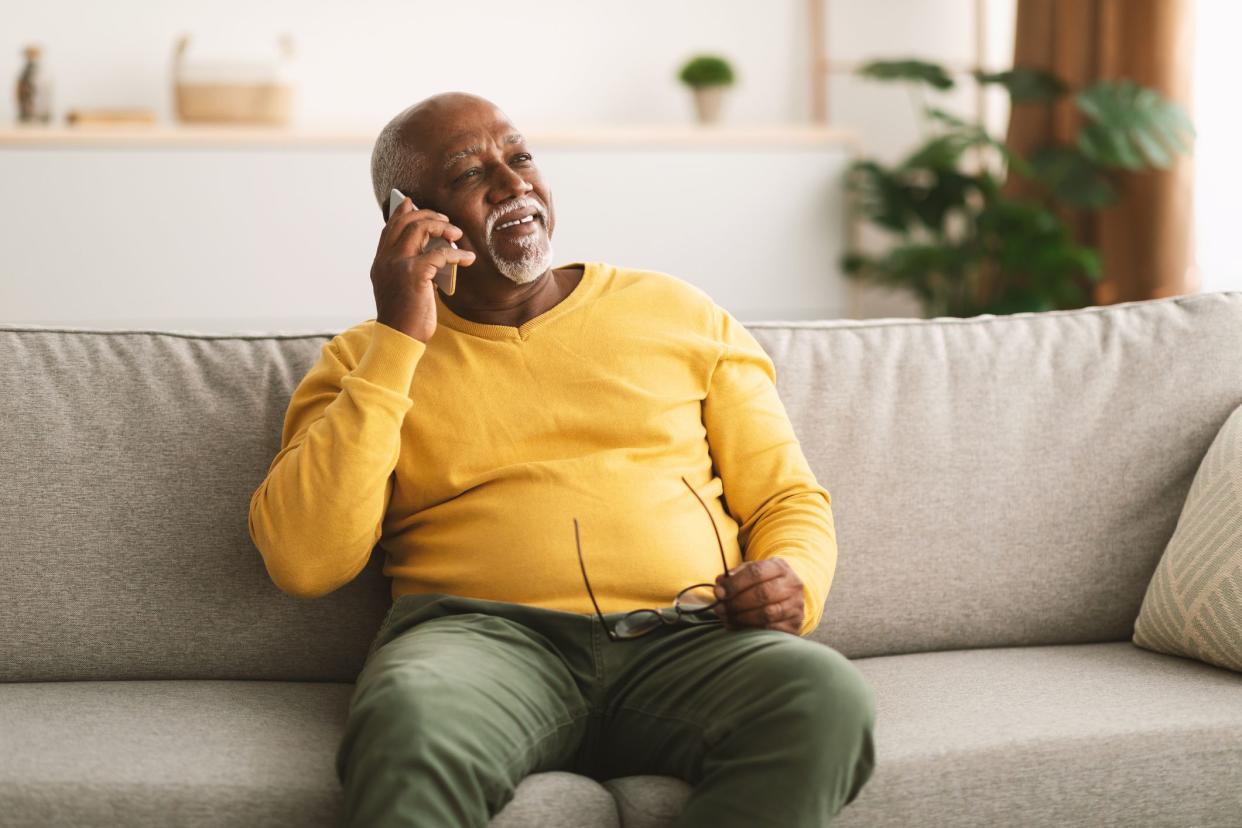
With Give InKind, it’s possible to set up a schedule of phone calls, where individual family members can ensure they touch base with your elderly loved one.
During such a tough time, it’s challenging to focus outside of ourselves. Sometimes you and your other family members might need a helpful prompt to stay in touch.
This way, someone will do their part every day, instead of days – if even weeks – going by without contact being made. Also, this effort to maintain a regular call schedule will establish a routine–and familiarity is essential when caring for someone with dementia.
On top of that, this will ease your anxiety. Use the Updates section on your page to help keep everyone regularly informed of what’s happening with your loved one’s general health.
Often, the worst thing is not knowing what’s happening. The more involved and dialed in you are, the more you can adapt and contribute to quality caregiving – even in the face of isolation.
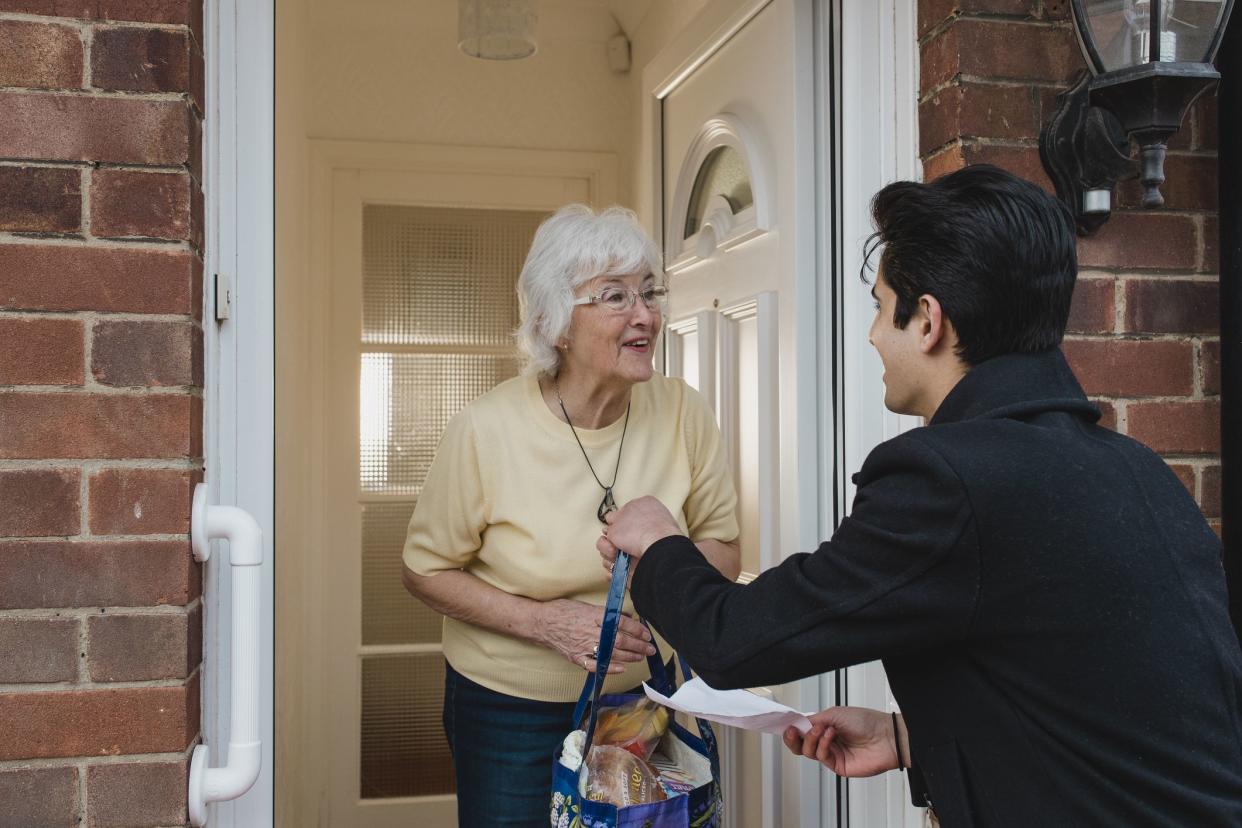
Did you know that sharing a family meal can help those suffering from dementia connect with you?
It helps to discuss matters such as recipes – which allows dementia patients to get in touch with their own personhood. It’s the sense of ritual or routine that can pay massive dividends in your loved ones’ quality of life.
Now, naturally, given that – to protect your elderly loved ones – you can’t visit them, this process requires creativity.
Coordinate these delivered meals with the scheduled phone calls. If possible, or advisable (depending on the situation), video calls could make the experience more tactile and pleasing to the senses.
Furthermore, mealtimes usually bring back our own memories that can be reminisced over and help your loved get in touch with their former selves. There is nothing that quite matches the warmth of a family meal.
DGLimages/istockphoto
Part of your scheduled care could be sending gifts, such as flowers, or a senior-curated gift box to your loved one suffering from dementia.
You should always be careful in these scenarios, though. Those suffering from dementia might not react well to something like flowers. For instance, a symptom of Alzheimer’s is eating non-edible items.
That doesn’t mean you can’t send flowers. Instead, you can send edible floral arrangements. This little wrinkle allows your loved one to enjoy the flower’s visual stimulation while protecting them from the more negative outcomes.
MaskaRad/istockphoto
Many studies cite emotional and behavioral benefits for dementia patients when they listen to and sing songs. Generally, musical memories remain in those with Alzheimer’s because it doesn’t inflict as much damage on those facets of the brain.
Direct benefits of sending video or audio recordings of your elder’s favorite song are:
- Stress relief
- Offsetting anxiety and depression
- Decreased agitation
Don’t fret if you aren’t the most musically talented of individuals. You can sing along with another track. Though, if you’re competent enough to play an instrument, that has its advantages too.
Be mindful of what kind of songs you’re sending. Soothing music can be crucial during mealtimes, while upbeat music will help provide a burst of energy when needed.
It’s also wise to encourage movement with clapping and dancing along, which is possible if you’re playing music during video calls. Of course, getting your loved one moving and active – with discretion – is exceptionally healthy. Namely, it can increase blood flow to the brain, which might help prevent further cognitive deterioration.
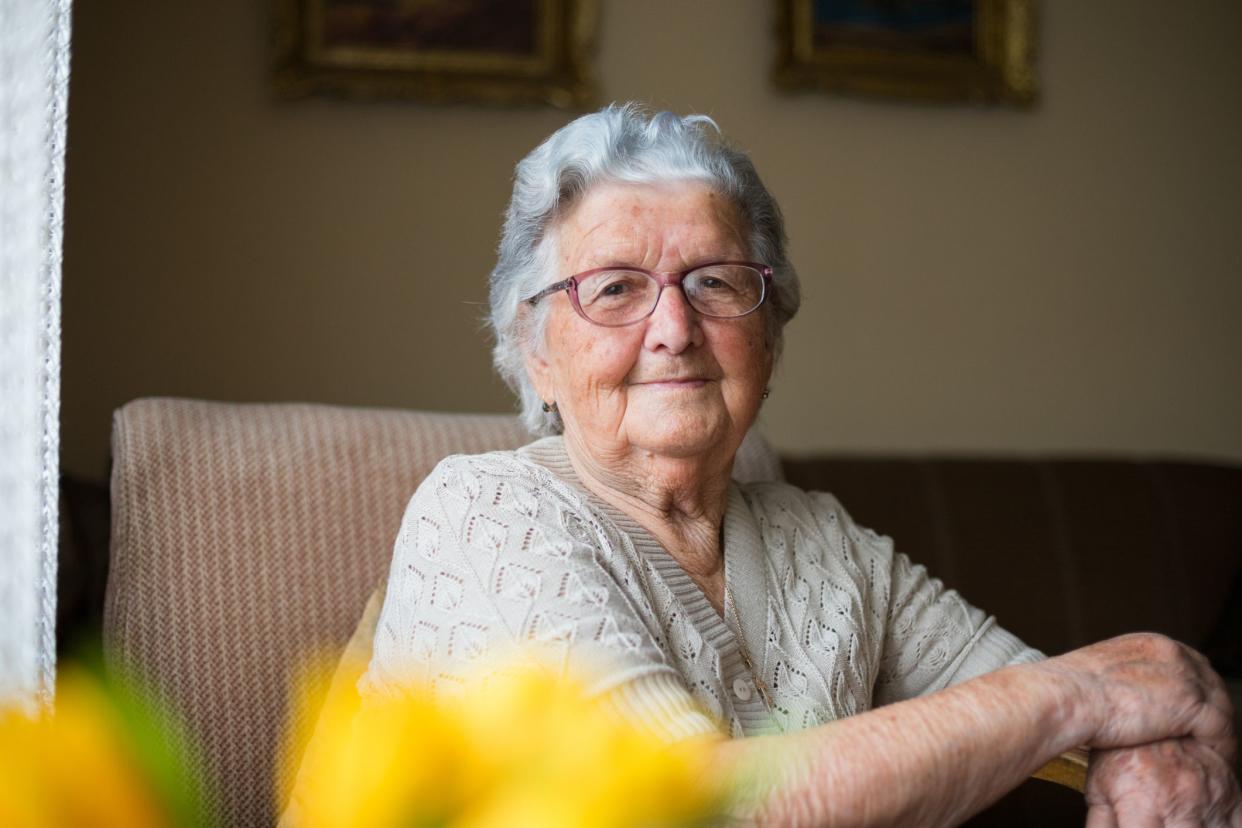
Times might be more challenging than they’ve ever been, but we mustn’t forget about those in our lives who are most vulnerable. Suffering from dementia is a lonely enough road without social isolation. Meaning, you must find safe and healthy ways to work around restrictions to make your loved ones feel at ease.
Following the above tips will go far in helping you establish a care regime from a distance, that you can maintain until everything re-opens. Once you ease back into physical visits, you’ll feel empowered to play a more significant role in bettering your elderly loved one’s life.
This article originally appeared on Giveinkind.com and was syndicated by MediaFeed.org.
Dobrila Vignjevic/istockphoto